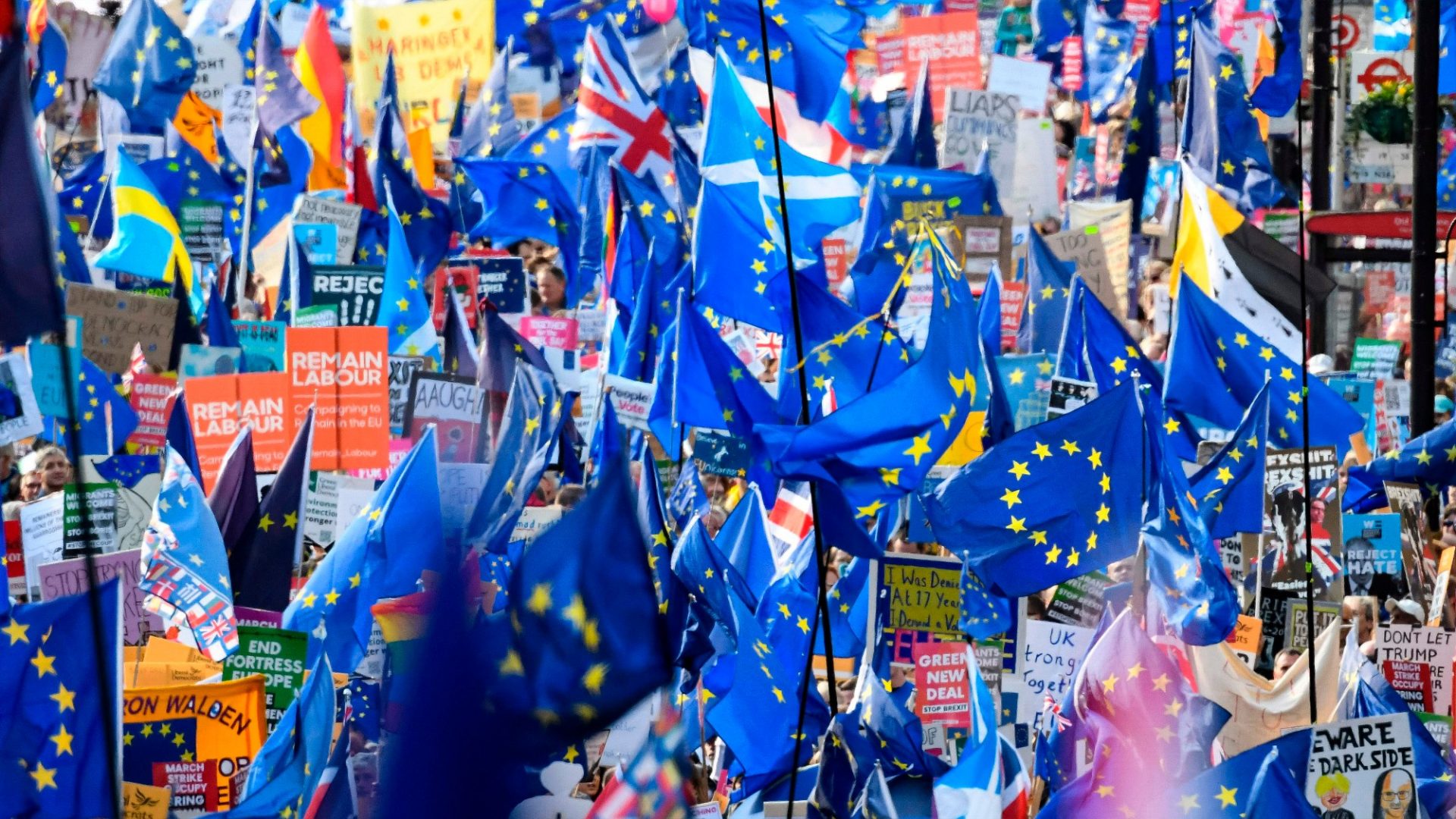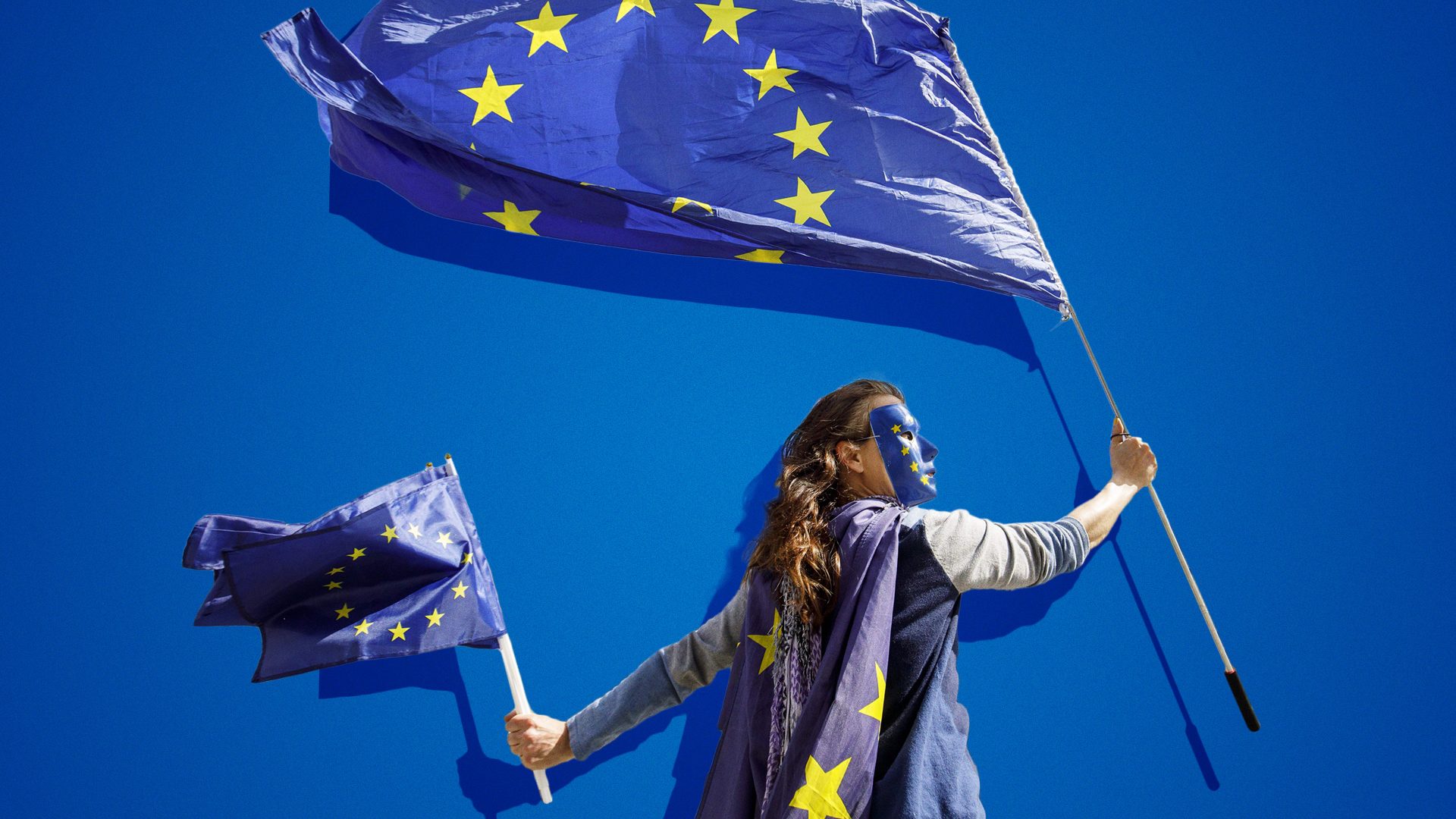At the 2019 general election, almost 53% of the electorate voted for parties offering either a second Brexit referendum or to stay in the European Union by revoking Article 50. This was a greater margin of victory than the 51.9% that won the 2016 referendum in the first place.
Yet Britain’s arcane voting system instead meant that the Conservatives, promising to “Get Brexit Done”, won a stonking majority. My vote, and that of millions of others, counted for nothing. Britain left the EU.
And now we are hurtling towards the general election and I’m in a bit of a pickle, because none of the political parties are making a pro-European argument. So I am a voter without a party, a politically homeless Rejoiner.
Readers of the New European will be only too aware of Brexit’s catalogue of horrors: tumbling trade with the EU, the 4-6% hit to GDP, inept trade deals, nightmares for farmers and fishers, healthcare and hospitality strapped for staff, investment dropping like a stone… they don’t all need repeating here.
The Resolution Foundation’s senior economist, Emily Fry, says Brexit is causing the economy to “lose momentum, like a tyre with a slow puncture”. Or as Bloomberg put it in March: “Brexit’s lasting damage is looking inescapable. By almost every economic and financial measure it has been disastrous for the UK.”
The public agrees. A Deltapoll survey in late May for the Brexity Mail On Sunday showed 53% wanting to rejoin the EU, with only 35% opting to stay out. This was no outlier. In the last 175 polls on the same question, conducted by six separate polling companies, only three have delivered a verdict in favour of staying out – and two of those were in early 2022. The vast majority of polls show Rejoin leading by double digits.
Yet, astonishingly for citizens like me who would vote in an instant for the UK to apply to rejoin the EU, no mainstream political party (in England at least) is listening.
The man likely to be the next prime minister, Keir Starmer, insists Labour won’t even consider rejoining the customs union or single market. No return to freedom of movement. Labour’s shadow minister for international development, Lisa Nandy, has described reversing Brexit as “a fantasy”.
Labour’s original position, until March this year, was that in power it would “renegotiate” Boris Johnson’s disastrous Brexit deal to “deliver on the opportunities Britain has… and end the Brexit divisions once and for all”.
When it realised this was not doable, it changed tack. Now it says it will introduce “a new security and defence pact with the EU that would underpin support for Ukraine and create a joined-up approach to defence procurement which would also open up other tangential areas of cooperation.” Oh, right.
Even the Liberal Democrats, who championed the EU at every previous election, merely “aspire to have closer ties” and ultimately “aim to place the UK-EU relationship on a formal and stable footing by seeking to rejoin the single market”. And while the Green Party makes strong pro-Europe noises, demanding Britain rejoin “as soon as the political situation is favourable”, it also admits the “decision to leave cannot be immediately reversed”.
So what should we millions do, come July 4? How should we vote when no party addresses our key demand? I turned to Best for Britain, which campaigns for ever-closer ties with the EU, for advice.
Its chief executive, Naomi Smith, said: “Britain’s outdated voting system is a national gerrymander, disenfranchising millions and more often than not handing total power to the Conservative Party on a minority of votes. This is particularly egregious when polls consistently show the public is in favour of more internationalist policies than those served up by the government, most recently on Brexit, with most recognising it was a mistake and wanting another vote.”
But how might that come about? She believes that, should the Tories lose the election, the new government must commit to proportional representation (PR) to remove the threat of constant Conservative minority rule. In the meantime, she admits that our hands are tied under Britain’s first-past-the-post system. We might have to vote for a party with which we don’t fully agree as a starting point for gaining a majority of MPs who might then favour reversing Brexit.
Her opinion is backed by Stephen Gilmore, spokesperson for Make Votes Matter. “Part of the reason issues like Brexit are not discussed is that during a general election the voters that parties want to attract are in the few seats that might change hands. If Brexit is not an issue for those swing voters then it is a non-issue overall.
“But PR allows parties to talk about issues other than those concerning the marginal constituencies. And if it’s an issue of importance to lots of people, then that will be fairly represented under PR. Of course, getting Brexit overturned is a tall order, but it’s more likely under PR if enough people share your view. Your vote counts for more.”
But right now we don’t have PR and a general election looms. What should I do in the meantime? Anti-Brexit campaigner Gina Miller is one of six candidates standing for her True and Fair Party. They have selected seats where polling shows Brexit regret is highest.
She says: “Labour and the Lib Dems are suffering PTSD from 2019. They are terrified that mentioning Brexit will bring forth calamity, but they are not reflecting public opinion.
“Brexit is responsible for so much damage and the public has realised it. In addition to economic turmoil, legal immigration is up and small boat crossings started all as a result of Brexit. Meanwhile, fruit rots in the fields and there’s nobody to work in social care.
“Labour says people are exhausted by Brexit. Perhaps, but that doesn’t mean we shouldn’t improve the status of those people. It’s the politicians’ job to fix things. Brexit is a disaster whether you’re tired of it or not.”
All true, but it still doesn’t fix my dilemma. Who should I vote for in the general election? “Knowing most people can’t vote for True and Fair, then it’s really a choice between Labour and the Lib Dems, hoping one might come around to changing their EU stance,” Miller replies. “Personally, I’d vote Lib Dem if put on the spot.”
The parties’ silence surrounding Brexit is also rankling once-staunch supporters. James Kingsland, from Shrewsbury, is a former Lib Dem activist. “It’s ludicrous we could go into an election with the majority who want to reverse Brexit not represented by any mainstream party outside Scotland. Politicians know perfectly well they can’t make Brexit work. They should lead opinion, not timidly ignore what’s happening,” he argues.
Lifelong Labour voter and former campaigner John Drake from Settle in North Yorkshire is more sanguine: “I’m a political realist so I’d urge fellow Remainers to vote for the party best placed to defeat the Tories in their constituency, even if their manifesto does not contain an explicit commitment to rejoin. There’s more hope of eventually winning the pro-European argument with a non-Tory government.”
There’s plenty of speculation about what Labour might or should do in power. Ruling out the suggestion from the president of the European Commission, Ursula von der Leyen, to allow young people to travel more freely in Europe was foolish. This and rejoining the Erasmus student exchange programme should be top of Starmer’s list.
He should state openly that a reset of the UK-EU relationship is his first goal, outlining his vision of the kind of outward-looking country the UK aspires to be under his premiership. Renewed relationships with EU governments and especially Brussels should be a priority, maybe via a dedicated government department for EU cooperation.
Labour should commit to adopting new EU business rules unless there is a genuine reason not to, and should start preparing the ground for shared security, energy partnerships and financial contributions to programmes that will benefit both the UK and the EU.
Starmer knows all this and deep down one suspects he is still a believer in the European project. Yet on all these matters, he and Labour remain silent.
There seems to be an argument that politically homeless Rejoiners should just vote Labour because it will all be all right and they’ll get on to sorting Brexit out at some stage. Rumours abound about Starmer’s covert pro-EU sensibilities.
Andrew Grice wrote in the Independent: “It is regrettable that Brexit will hardly feature in the general election campaign. But I can see why: the Tories would love to see Starmer suddenly rediscover his inner pro-European. On the EU, we will have to wait to see the real Keir Starmer. Pro-Europeans should remember he still has an election to win. The prize will be worth waiting for.”
But again, it’s mere speculation and that cuts no ice with me, especially when Labour have expressly ruled out such scenarios. I have a vote to cast and need a firm commitment, not vague optimism.
Many voters who backed the Tories in 2019 for the first time now feel they were pawns in an election-winning strategy. A growing number would like to revisit the decision to leave the EU.
As Alastair Campbell eloquently wrote in this publication: “So scared is the Labour leadership of upsetting former Brexit voters that it has ended up defending a policy that people once voted for but now realise was a scam. They know Brexit and levelling-up were lies through their personal experience. Yet still Labour pretends it can ‘Make Brexit Work’. It can’t. Nobody can.”
But it’s not only that no party will commit to rejoining or a second referendum, it’s that none of them will mention Brexit at all. Global supply chain issues, Covid, Putin, Gaza, the dog ate the withdrawal agreement. Britain’s problems are seemingly caused by anything, anything but Brexit. Which is why Rejoin voters are in a pickle.
So it seems I should hold my nose and vote Lib Dem, or maybe Green. But in my constituency both would be wasted votes. Without PR, it is a dilemma many voters face.
Meanwhile, Miller issues a further warning. “The mainstream parties’ silence over Brexit is as damaging as the original Brexiteer lies. The vacuum means that space is filled with spurious arguments such as ‘Brexit wasn’t done properly, that’s why things are bad’ or ‘The EU is punishing us’ or ‘Remoaners won’t back it, that’s why it’s gone wrong’.
“Less savoury opinions also fill that space, forming alliances with groups such as anti-vaxxers. By staying quiet on Brexit, Labour and the Lib Dems facilitate that.”
It needn’t be this way. Try something and don’t like it? Change your mind. That’s democracy.
So why, this July, does it seem we will be denied it?




